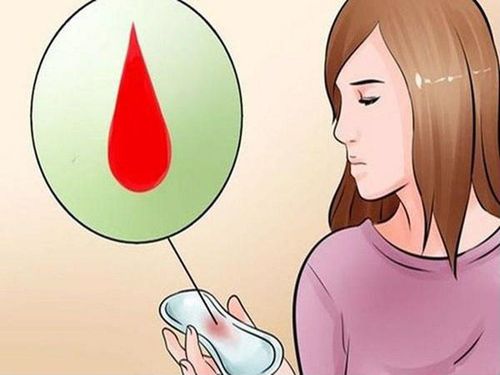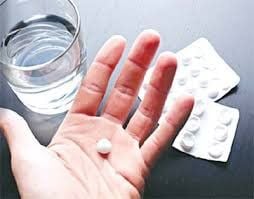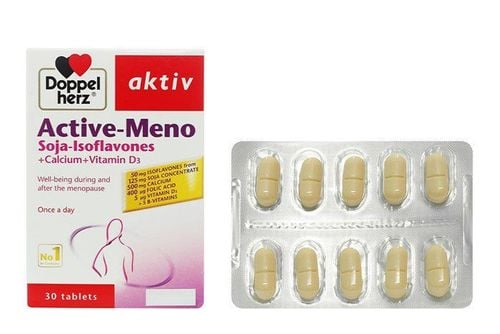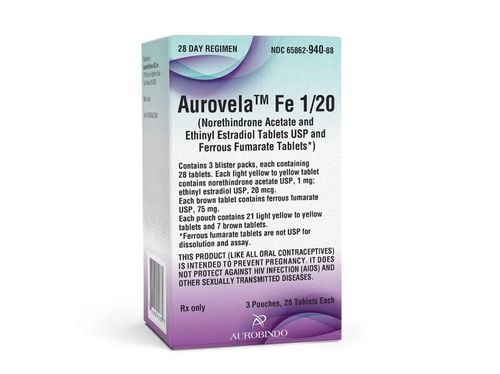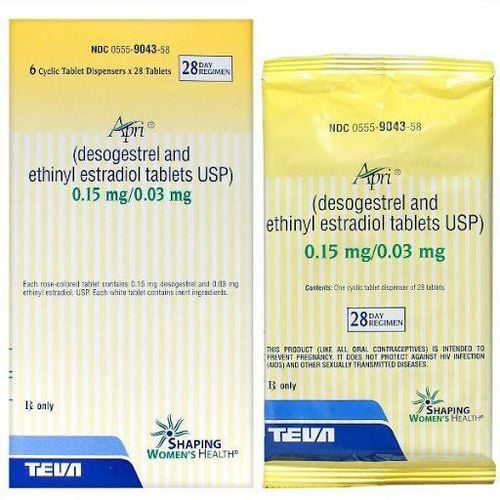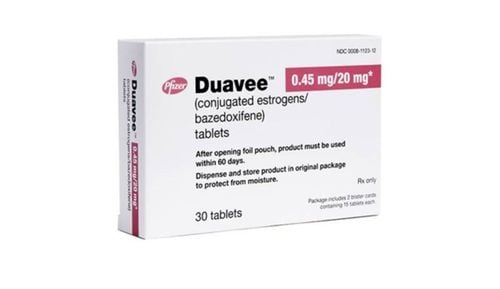This is an automatically translated article.
Menopause is the period when a woman is no longer able to reproduce, marking the end of the menstrual cycle. During this period, a woman's body makes less of the hormones estrogen and progesterone. Low hormone levels can lead to symptoms such as night sweats, hot flashes, vaginal dryness, bone thinning, etc. So should female hormone pills be taken after menopause?
1. Hormone therapy
Hormone replacement therapy is the use of female hormone medications to replace the estrogen that the body stops making during menopause. Hormone therapy is often used to treat common menopausal symptoms, including hot flashes and vaginal discomfort.
Hormone therapy has also been shown to prevent bone loss and reduce fracture risk in postmenopausal women.
However, there are risks associated with the use of female hormone pills. These risks depend on the type of hormone therapy, the dose, the length of time it is taken, and the individual health risks of the user. For best results, hormone therapy should be individually tailored and reassessed regularly to make sure the benefits outweigh the risks.
2. Basic types of hormone therapy
Hormone replacement therapy mainly focuses on replacing the estrogen a woman's body no longer makes after menopause. There are two main types of estrogen therapy:
Systemic hormone therapy: the use of female hormones. Systemic estrogen comes in forms such as oral tablets, skin patches, gels, sprays, etc. containing doses of active ingredients. estrogen is higher than the amount absorbed by the body, this therapy can be used to treat any symptoms of menopause. Low-dose Vaginal Products: Low-dose estrogen vaginal suppositories in cream, tablet, or ring form - help reduce the amount of estrogen absorbed by the body. Therefore, low-dose vaginal preparations are generally used only to treat the vaginal and urinary symptoms of menopause.
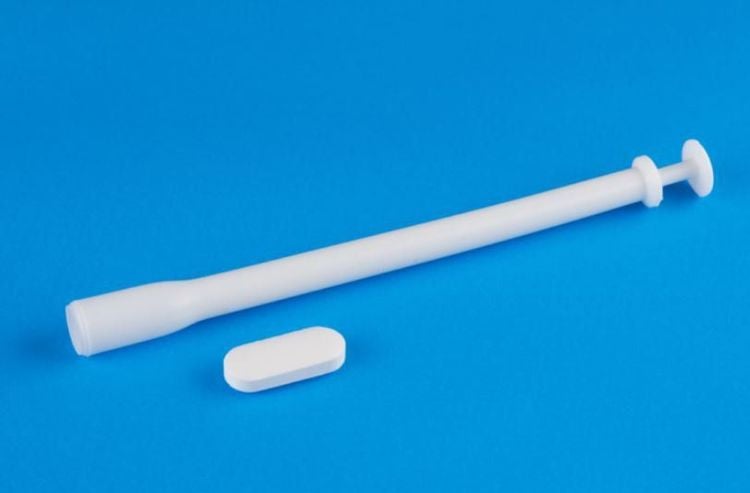
Thuốc nội tiết tố nữ đặt âm đạo dạng viên nén
If the user has not had a hysterectomy, the doctor will usually prescribe estrogen along with progesterone or a progestine (progesterone-like drug). Because if estrogen alone, there is no balance because progesterone will stimulate the growth of the uterine lining, increasing the risk of endometrial cancer.
If a female hormone user has had a hysterectomy, progestin may not be needed.
MORE: Should women use hormone replacement therapy during menopause?
3. The risks of using female hormone drugs
In the largest clinical trial to date, hormone replacement therapy including an estrogen-progestin pill (Prempro) has been shown to increase the risk of several serious conditions including:
Heart disease; Stroke ; Blood clots; Breast cancer. Subsequent studies suggest that these risks vary depending on:
Age: Women who start hormone therapy with female hormone drugs at age 60 or older or take the medication more than 10 years later from starting Early menopause has a higher risk of these conditions. But if hormone therapy is started before age 60 or within 10 years of menopause, the benefits seem to outweigh the risks. Type of hormone therapy: The risks of hormone therapy vary depending on whether estrogen is used alone or in combination with a progestin and depends on the dose and type of estrogen. Health history: Family history, medical history, cancer risk, heart disease, stroke, blood clots, liver disease, and osteoporosis are important factors in determining whether hormone replacement therapy is beneficial. suitable for the patient or not. All of these risks should be weighed by the patient and physician before deciding on hormone therapy.

Thuốc làm tăng nguy cơ gặp phải một số tình trạng nghiêm trọng như bệnh tim
4. When to use hormone therapy with hormonal drugs for menopause?
Many women who are or have gone through menopause wonder if they should take female hormone pills or not? The benefits of hormone therapy may outweigh the risks if the user experiences the following:
Moderate to severe hot flashes: Systemic estrogen is still an effective treatment for hot flashes. hot flashes and night sweats during menopause; Have other symptoms of menopause: Estrogen can ease vaginal symptoms such as dryness, itching, burning, and pain during intercourse; Need to prevent osteoporosis or fractures: Systemic estrogen helps protect the body against osteoporosis. However, bisphosphonates are the first line of treatment for osteoporosis. The female hormone estrogen may be helpful when other treatments have failed; Premature menopause or estrogen deficiency: women who have had their ovaries removed before the age of 45 or who have menopause before 45 years of age or who have decreased ovarian function before the age of 40 (primary ovarian failure), When the patient's body has less estrogen than usual, the use of hormonal drugs for menopause can reduce the risk of diseases such as osteoporosis, heart disease, stroke, dementia and diabetes. mood change.
5. Dosage forms of female hormone drugs
Hormonal drugs for menopause have dosage forms including oral tablets, patches, gels, vaginal creams, suppositories or slow-release vaginal rings. If menopausal women have symptoms related to the vagina, the estrogen in low-dose vaginal creams, tablets, or slow-release rings is more effective than oral pills or patches.
Dosage should be limited, preferably the lowest effective dose for the shortest possible time. Women under 45 need adequate amounts of estrogen to protect their health from the long-term effects of estrogen deficiency. For women with persistent menopause symptoms and a significant decrease in quality of life, your doctor may recommend longer-term treatment.
While taking a female hormone medication, patients need to have regular follow-up visits to ensure that the benefits of hormone therapy still outweigh the risk of side effects. At the same time, it is necessary to have a mammogram and a pelvic exam for follow-up.
Choose a healthy lifestyle: exercise every day, build a healthy diet, maintain a reasonable weight, don't smoke, limit alcohol intake, stay away from all stress, and control Good for chronic diseases such as high cholesterol or high blood pressure. If a woman has not had a hysterectomy and is taking systemic estrogen therapy, a progestin will also be needed.

Thuốc nội tiết cho người mãn kinh có các dạng viên uống và nhiều dạng khác
6. What to do when female hormone pills cannot be used?
When not using hormonal drugs, women need to control hot flashes with a healthy lifestyle such as limiting drinks containing caffeine and alcohol, keeping breathing relaxed or doing some body relaxation other. There are also a number of non-hormonal prescription medications that can help reduce hot flashes.
For vaginal problems such as dryness or painful intercourse, a vaginal moisturizer or lubricant can help relieve discomfort.
In a nutshell, to see if supplemental hormone therapy is beneficial, talk to your doctor about your symptoms and individual health risks. Stay in touch with your doctor throughout the menopausal years.
To help women monitor and manage their health during perimenopause and menopause, Vinmec International General Hospital is providing a pre-menopausal health check and consultation package. When registering for an examination package, customers will be examined and consulted with a specialist in Gynecology; Perform tests to assess hormone status. When registering for the pre-menopausal health care and consulting package, customers will receive:
Gynecological specialist examination Gynecological examination, breast examination Transabdominal ultrasound of the uterus and ovaries Take specimens as a smear cervical-vaginal cytology Mammogram (2 sides) Osteoporosis Measure other tests to detect premenopausal conditions if any. When the examination results are available, customers will be advised on appropriate nutrition, exercise and hormone supplements.
Please dial HOTLINE for more information or register for an appointment HERE. Download MyVinmec app to make appointments faster and to manage your bookings easily.
References: mayoclinic.org, fda.gov, nhs.uk



